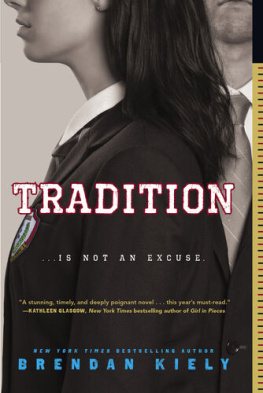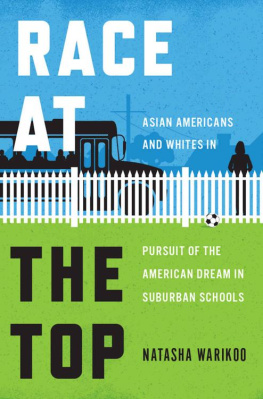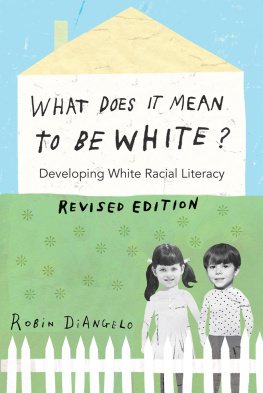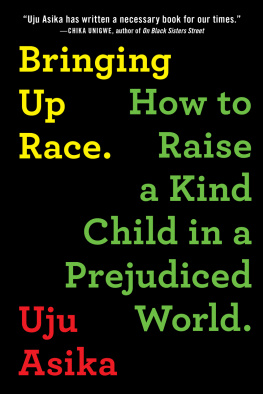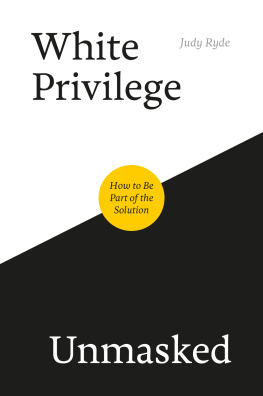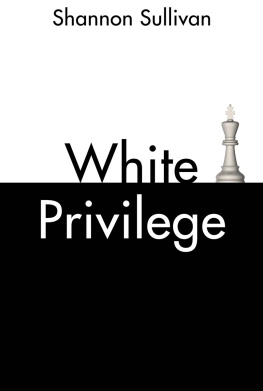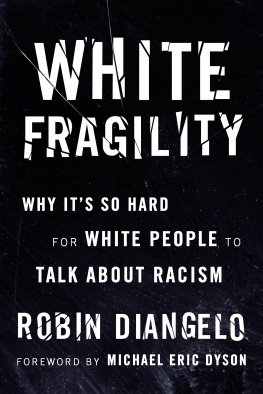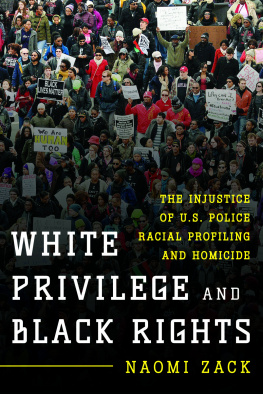Contents
Guide
Pagebreaks of the print version
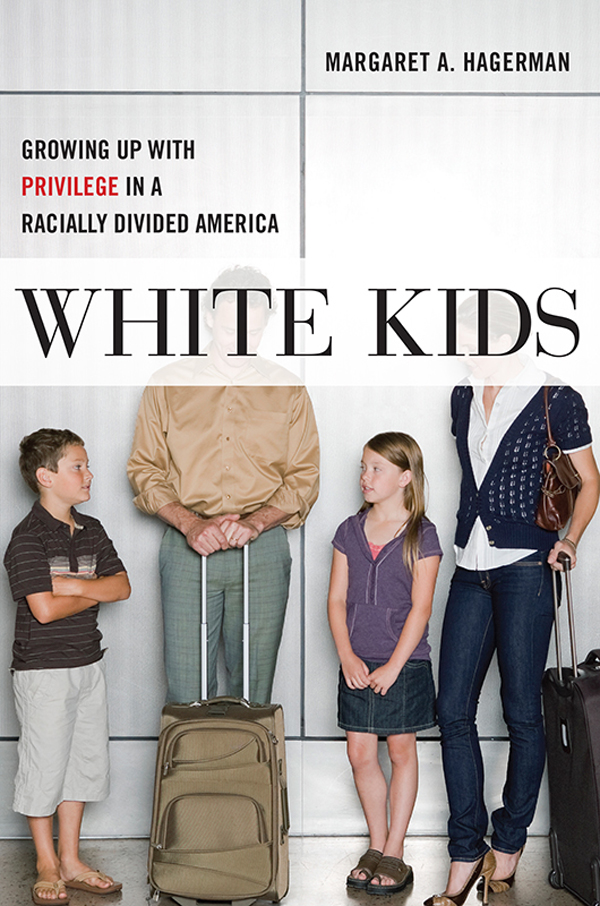
WHITE KIDS
CRITICAL PERSPECTIVES ON YOUTH
General Editors: Amy L. Best, Lorena Garcia, and Jessica K. Taft
This series aims to elaborate a set of theoretical and methodological tenets for a distinctive critical youth studies approach rooted in empirical inquiry. The series draws on the following as some of the key theoretical elements of critical approaches: the socially constructed nature of childhood and adolescence over and against the universalizing and naturalizing propensities of early developmental theory; the centering of young peoples social worlds and social locations as the starting point for analysis; exploration of how the meaning and experience of youth is shaped by other important axes of social difference, including but not limited to race, class, gender, place, nation, and sexuality; the recognition that youths worlds are constituted through multiple processes, institutions, and discourses and that central to understanding youth identity and experience is understanding social inequalities; engagement with the dynamics of global transformation in the experience of childhood and youth; and the relevance of these elements for policy and practice.
Books in the series:
Fast-Food Kids: French Fries, Lunch Lines, and Social Ties
Amy L. Best
White Kids: Growing Up with Privilege in a Racially Divided America
Margaret A. Hagerman
White Kids
Growing Up with Privilege in a Racially Divided America
Margaret A. Hagerman

NEW YORK UNIVERSITY PRESS
New York
NEW YORK UNIVERSITY PRESS
New York
www.nyupress.org
2018 by New York University
All rights reserved
References to Internet websites (URLs) were accurate at the time of writing. Neither the author nor New York University Press is responsible for URLs that may have expired or changed since the manuscript was prepared.
ISBN: 978-1-4798-0368-2
For Library of Congress Cataloging-in-Publication data, please contact the Library of Congress.
New York University Press books are printed on acid-free paper, and their binding materials are chosen for strength and durability. We strive to use environmentally responsible suppliers and materials to the greatest extent possible in publishing our books.
Manufactured in the United States of America
10 9 8 7 6 5 4 3 2 1
Also available as an ebook
CONTENTS
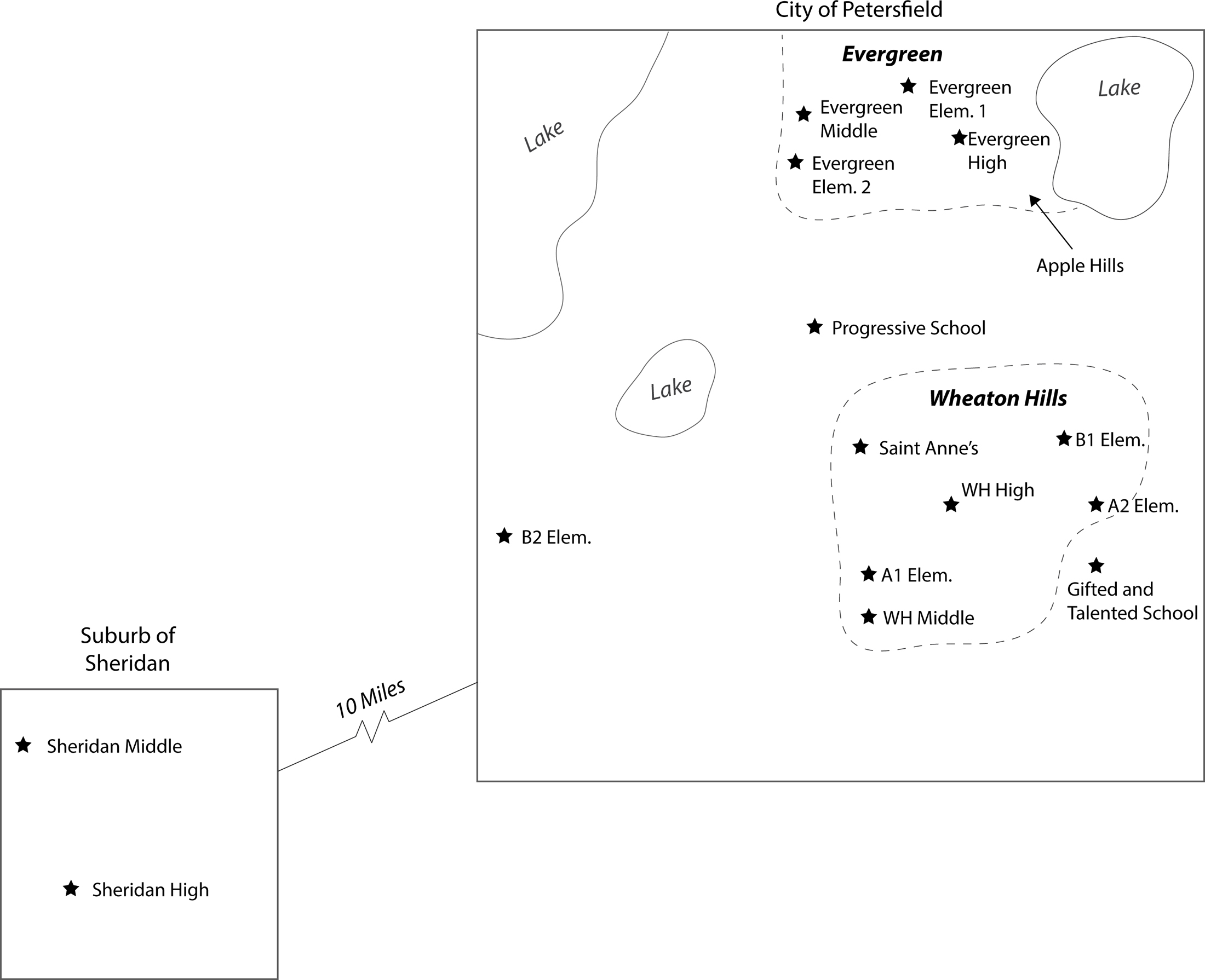
Map of Petersfield and Sheridan
Introduction
Racism is not a problem anymore. Racism was a problem when all those slaves were around and that, like, bus thing and the water fountain. I mean, everything was crazy back in the olden days. But now, I mean, since Martin Luther King and, like, Eleanor Roosevelt, and how she went on the bus. And she was African American and sat on the white part. After the 1920s and all that, things changed.
Natalie (11, Sheridan)
I think [racism] is a way bigger problem than people realize. Its nowhere near what it used to be. Its just different, and white people dont realize it. I think its still there. Its just not as present, and people want to hide it. Because they are scared to talk about it.
Conor (11, Evergreen)
I think that the white kids, since they have more power in general in society, disciplinary actions arent brought down as hard upon them. But when its, you know, a black kid getting in trouble with the police, I think people are going to be tougher with them, because, you know, [black kids] cant really fight back as well.
Chris (11, Wheaton Hills)
Natalie, Conor, and Chris are all growing up in the same midwestern metropolitan area. They are 11-years-old and in middle school. They all participate in a variety of sports and extracurricular activities, and they have busy social lives with their friends. These kids often travel with their families across the country, sometimes even across the globe. All three attend expensive summer camps and enrichment programs, most play instruments and take private music lessons, and many of them have attended private school or have received private tutoring, at least once in their lives. Like most kids, they are interested in popular culture, though their favorite celebrities vary, especially with respect to Justin Bieber. Every single one loves animals.
Overall, the children in this book are growing up with upper-middle-class privilege in a society where private wealth shapes the experiences, opportunities, and outcomes that follow such childhoods of privilege. These kids have parents with some of the highest levels of educational attainment possible, being alumni of world-class law schools, medical schools, graduate schools, and business schools. These childrens parents work in highly prestigious and influential professions and earn lucrative incomes. These parents also all experience heterosexual privilege. While a small number of the mothers in this study do not work outside the home, these women are heavily involved in their childrens schools, their local churches and synagogues, and charitable and volunteer organizations. They all have college educations, the majority holding advanced degrees. The fathers all work outside the home, and some are highly involved in the daily lives of their children and coach sports teams or lead clubs. These children are growing up in valuable, well-maintained single-family homes that their parents own, and some families even have vacation homes in different parts of the country.
But these children are not only privileged in that they benefit from the wealth of their parents: these kids are also growing up white and with racial privilegeor as founding figure of American sociology W. E. B. Du Bois wrote, with a public and psychological wage: the wages of whiteness.
Evidence that we live in a society in which race shapes the lived experiences, opportunities, and outcomes of people can be seen across a range of institutions. The list goes on and on. To put it in simple terms, then, all children growing up in the United States have lives that are structured by raceand this includes the affluent, white kids in this book.
As the epigraphs to this chapter make clear, however, not all white kids think about race in the same way. Despite the similarities in structural privileges that these children have, despite the fact that sociologists often tend to assume these kids think alike, despite these kids shared interests, and despite the fact that they all live within one metropolitan area, these white, affluent kids have different understandings of race and racism in America today.
I spent two years studying these white children and their families and can show that these kids talk about and interpret race differently. Their subtle behaviors reflect that they think about race and class inequality differently, and the experiences they have with their families and in their day-to-day interactions are substantively different from one another. For example, while some of the 36 children in this study believe racism is present in todays society, some do not. While some of these children believe that the police racially profile and abuse black and Latinx youth, some believe that black and Latinx youth are bad kids because their parents do not care about them. Some of these children are close friends with children of color, and some of these children rarely even see a person of color. Similarly, while some think that all schools in the United States provide kids with the same education, others speak passionately about how unequal schools in the United States are a big problem. Some children believe that the impact of slavery on the black community with regard to wealth holdings can still be seen today, yet other children believe that slavery and the civil rights movement era were one and the same. Some of these kids believe that talking about race makes you racist, while other children think white people need to talk and think carefully about race much more often. Some children think that black people have extra muscles that make them jump higher, while other children think this is absurd. While some of these children believe people get rich because they work hard, some have other ideas about the causes of social stratification. And while some of the children in this study thought the shooting of Trayvon Martin was a grave violation of human rights and evidence of continued racial violence and racism in the United States, other children did not even know Trayvons name.


